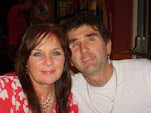


The Cobh HOUSE CROW feeding on bacon kind courtesy of Papa John's and roosting on its favoured section of guttering.
Garry Bagnell (middle) celebrating his 500th bird in Britain and Ireland with LGRE and Chris Heard
Following on from my previous statements made about the veracity and 'countability' of the Cobh Harbour INDIAN HOUSE CROW (Corvus splendens), the Dutch Rare Birds Committee also make special 'exception' for this species. Arnoud B van den Berg writes ''Although the CDNA does not accept records of ship-assisted birds, House Crow is the (only) exception; in this species, ship-assisted passage is considered a normal way of dispersion (Dutch Birding 17: 256-257, 1995)''
I must also add that a similar criterion has been applied to an assortment of AFRICAN PIED CROW (Corvus albus) records in Europe, where individuals of this species have been discovered close to ports.
THE COBH HARBOUR INDIAN HOUSE CROW
(Detailed Directions)
Driving from the Rosslare Harbour in County Wexford, keep on the N25 all of the way signposted towards Cork. This road is vastly improved with an excellent new bypass around Waterford and it should take just over two hours to reach the turn-off to Cobh just west of Midleton. Take the R624 south on to the Great Island, remembering to bear right after the humpback bridge. This eventually brings you in to Cobh proper and continue around until you reach the town centre and the main Westbourne Terrace and Lusitania monument. Parking is very limited here and by special disc and the House Crow itself can be easily located in the vicinity of the Papa Johns restaurant, currently being refurbished. It favours the drain pipe cover above and the sheltered rim and commutes between there and the grass adjacent to the toilet block on the harbour front. It is frequently vocal and does mimic Jackdaws.
It represents the second record for IRELAND following the first European record at Dunmore East and elsewhere (County Waterford) from 3 November 1974 until at least December 1976 (Birding World 7: 258; Dutch Birding 18: 8-9; Evans 1990, Rare Birds in Britain and Ireland, page 442 and 1974/75 Waterford Bird Report). Further reports suggest it was still alive in 1980 (per Harry Hussey)
I must also add that a similar criterion has been applied to an assortment of AFRICAN PIED CROW (Corvus albus) records in Europe, where individuals of this species have been discovered close to ports.
THE COBH HARBOUR INDIAN HOUSE CROW
(Detailed Directions)
Driving from the Rosslare Harbour in County Wexford, keep on the N25 all of the way signposted towards Cork. This road is vastly improved with an excellent new bypass around Waterford and it should take just over two hours to reach the turn-off to Cobh just west of Midleton. Take the R624 south on to the Great Island, remembering to bear right after the humpback bridge. This eventually brings you in to Cobh proper and continue around until you reach the town centre and the main Westbourne Terrace and Lusitania monument. Parking is very limited here and by special disc and the House Crow itself can be easily located in the vicinity of the Papa Johns restaurant, currently being refurbished. It favours the drain pipe cover above and the sheltered rim and commutes between there and the grass adjacent to the toilet block on the harbour front. It is frequently vocal and does mimic Jackdaws.
It represents the second record for IRELAND following the first European record at Dunmore East and elsewhere (County Waterford) from 3 November 1974 until at least December 1976 (Birding World 7: 258; Dutch Birding 18: 8-9; Evans 1990, Rare Birds in Britain and Ireland, page 442 and 1974/75 Waterford Bird Report). Further reports suggest it was still alive in 1980 (per Harry Hussey)







